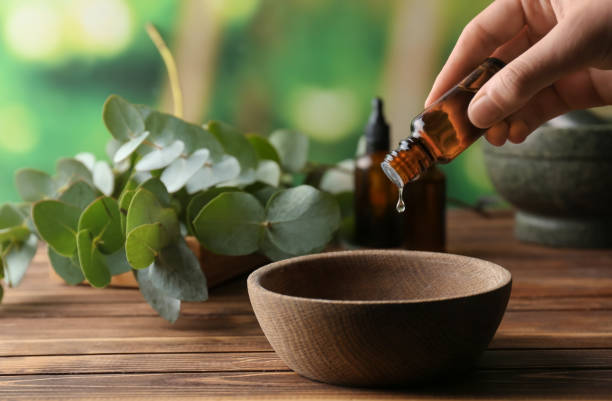

Essential oils are made from various parts of plants and are then concentrated into oils. They’re considered ‘essential’ because the oil captures the “essence” of the plant it was distilled from.
First used by the Egyptians, Greeks, and Romans, then popularised by French chemist René-Maurice Gattefossé, essential oils have different uses beyond aromatherapy.
Tea Tree Oil

Tea tree oil is extracted from the leaves of the tea tree in Australia. Known for it’s powerful anti-bacterial and anti-fungal properties, it might be one of the most popular oils in homeopathy.
When diluted and mixed with shampoo, can alleviate dandruff and scaly patches on a baby’s scalp known as ‘cradle cap’.
Tea tree oil is also successful when treating toenail fungi and athlete’s foot in higher concentrations. It’s anti-inflammatory properties also makes it a contender for treating acne.
When using essential oils for the first time it’s recommended to do a patch test on your skin to detect allergic reactions the dilute the oil as needed.
Fennel Oil

Distilled from the Fennel plant, this oil can be used as a substitute for peppermint and reduces digestive discomfort.
Fennel essential oil promotes gut health and relieves constipation. The oil can also treat Irritable bowl syndrome (IBS) and bloating. Because it dissipates quickly, fennel oil works almost immediately in vapor form providing rapid relief.
This oil may also reduce menstrual cramping as it’s considered as an anti-spasmodic.
Like most essential oils, it’s anti-bacterial and an anti-fungal and may even have cancer fighting effects. A study on fennel extract found that the oil stopped the spread of human breast cancer cells and induced cancer cell death.
However, more studies need to be done before utilising this oil as a cancer treatment.
Eucalyptus Oil

Directly distilled from from the leaves of the Eucalyptus plant, this essential oil is one of the best natural disinfectants. The alpha-pinene compound found eucalyptus oil can be used as an insect repellant.
Eucalyptus oil is a necessity for the flu season. Breathing in drops of eucalyptus essential oil to a bowl of hot water can loosen phlegm and blocked sinuses. The oil opens nasal passages and reduces nasal stuffiness and eases asthma as it is a vasodilator.
Eucalyptus also reduces pain associated with inflammatory conditions like arthritis, and is a popular ingredient in ointments.
Chemicals in the oil like 1,8-cineole is an effective pest control and spraying eucalyptus oil solution on rodent hotspots can reduce mice infestations. Eucalyptus oil is also safer for the environment than DEET sprays with strong chemicals.
Be advised that these oils are not supposed to be used as replacements for traditional medicine but should be used in conjunction with traditional treatment options.






Comments